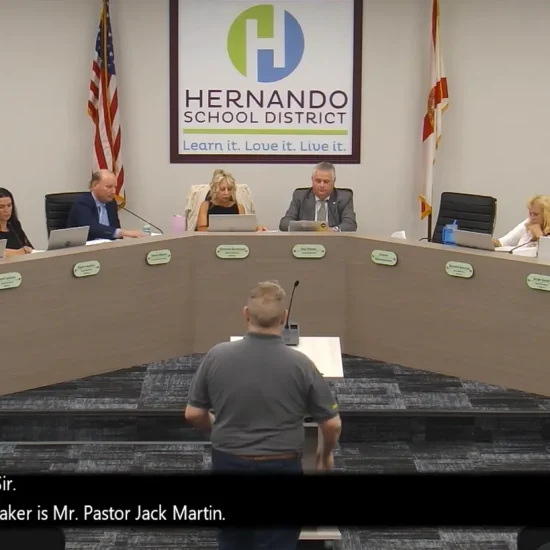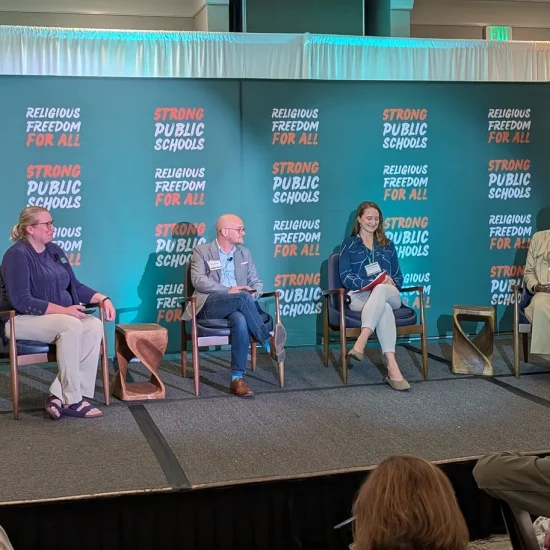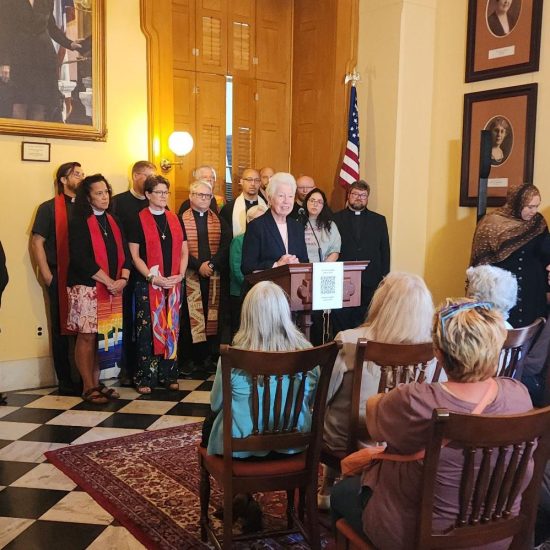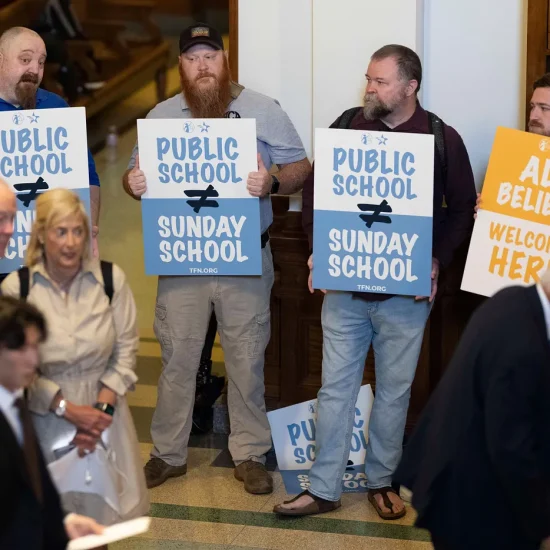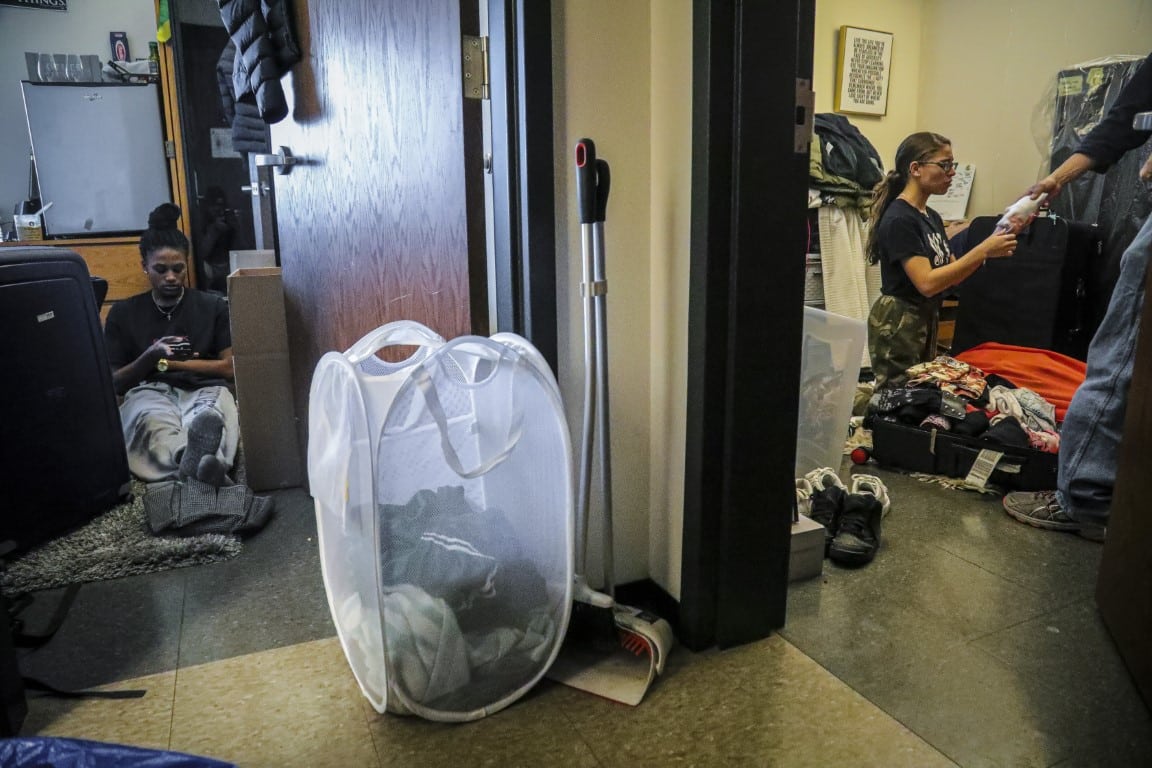
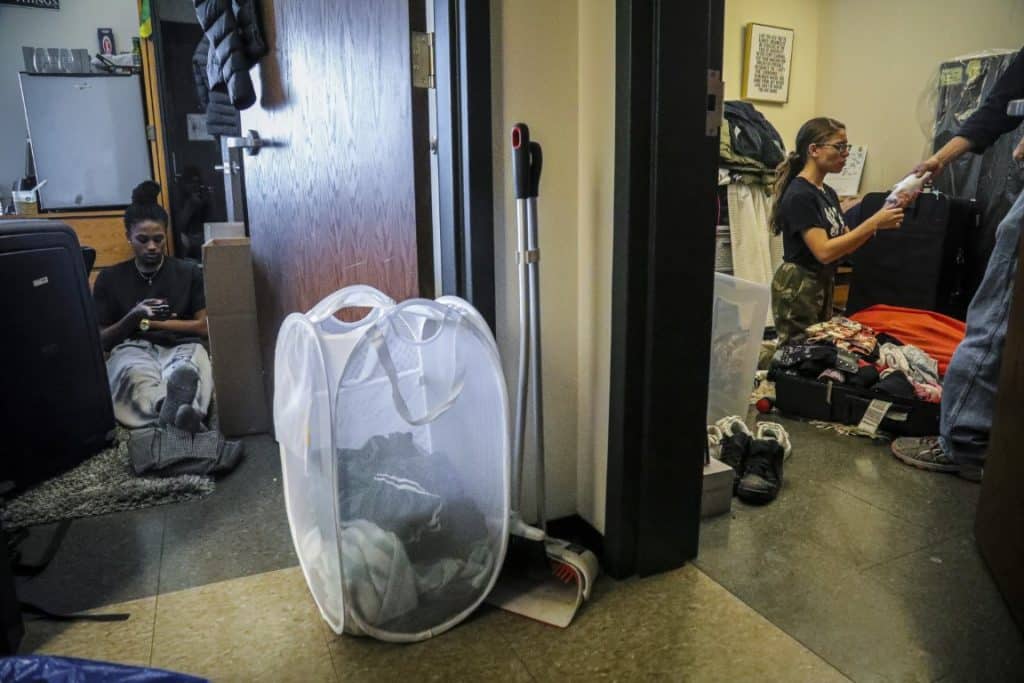
Princeton University students Halima Matthews, 20, left, and best friend Deztynee Rivera, 20, right, pack their rooms to leave after the institution closed campus with plans to continue instruction online due to COVID-19, Saturday, March 14, 2020, in Princeton, N.J. Rivera, a neuroscience junior from Bronx, N.Y., said “It’s very stressful, because we are losing the social part of school” and fears that the benefits of campus engagement with professors will not be replicated in video. March 19 is the deadline for all undergraduates to leave campus, except those meeting specific criteria. (AP Photo/Bebeto Matthews)
BOSTON (RNS) — When students at Harvard University received an email from the school announcing that students had five days to pack up and move out of their residence halls, anxiety spiked across campus.
“I CAN’T go home to Jamaica, especially on such short notice,” Harvard senior Hakeem Angulu wrote in a now-viral thread on Twitter. He continued: “the visa I’m using to work after I graduate necessitates that I stay in the US until I get the authorization document in July….this is a sick joke.”
The university’s humanist chaplain, Greg Epstein, saw his post and responded: “This is what chaplains and other advocates are for.
“If it is virtually impossible to go home, you/others in your position will likely need to ask to stay,” Epstein wrote. “If anyone at Harvard gives you any crap about that whatsoever, that is when you call in someone like me. Let me or others be your advocate.”
As university campuses around the country shut down and move classes online in efforts to prevent the spread of the novel coronavirus, chaplains and faith-based campus groups are stepping in to ease the transition.
At Cornell University, where the university abruptly announced on Friday that classes would end that evening, Jewish and Christian student groups have been working to help students navigate the disruptions of the pandemic.
Since the announcement, Cru (a national interdenominational Christian group on campuses across the country) at Cornell has focused on collecting moving boxes, driving students around and helping find storage spaces for their belongings.
“Helping students both move out and get settled seems like it’s going to be a big part of our job over the next few weeks,” said J.W. Betts, campus team leader of Cru at Cornell.
And they will continue their spiritual mission on campus as well, even just a few international students remain, he said. “As long as there are any students on campus, we will continue to hang out and preach the Gospel,” Betts said.
The Jewish student group Hillel, which had to cancel many of its events, is also counseling Cornell students struggling to process what is happening.
“One of the core teachings of Purim is that we are not always in control,” wrote Cornell Hillel’s director, Rabbi Ari Weiss, and board president Avi Kupperman in a message to members, referring to the recent Jewish holiday. “Like many of you, we’ve personally felt the impact of the novel coronavirus, COVID-19, and understand the feelings of uncertainty that you may be experiencing.
“In this time of transition, we want to assure you that Cornell Hillel is a constant. In the next two weeks, Hillel is doubling down on its commitment to supporting you, and providing opportunities for students to connect to community, each other, and Jewish wisdom.”
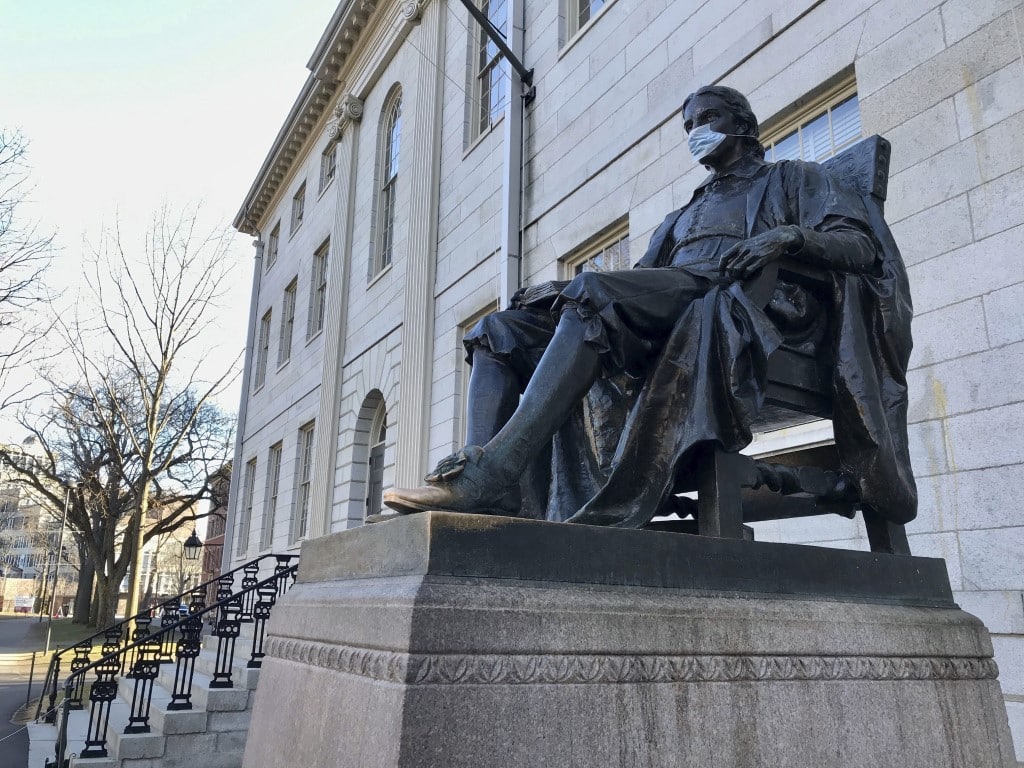
The John Harvard statue at Harvard University, a popular tourist attraction at the campus in Cambridge, Mass., sits adorned with a medical mask as students prepared to leave campus, Saturday, March 14, 2020. The university has asked students to leave by Sunday afternoon and stay home after spring break to prevent the spread of the new coronavirus. (AP Photo/Collin Binkley)
That includes Shabbat dinner planned on campus for the next two weeks and an event for packing care packages for refugees, as well as offering up its rabbis to help students “process crisis and find connection and resilience” during daily open coffee hours around the campus.
At Tufts University, which has asked dorm residents to move out and where a student was recently diagnosed with COVID-19, a Protestant chaplain, the Rev. Daniel Bell, says he is looking into secure and accessible methods for offering students pastoral care meetings and even worship services online.
“In the days and weeks ahead, we will be working on offering creative ways to stay in touch with students virtually while still maintaining a consistent on-campus presence,” Bell said. “We are all learning to remain flexible, resilient and grounded in the present moment, no matter what the future brings.”
Nathan Albert, an associate chaplain at the University of Lynchburg in Virginia, said he and his fellow chaplains will send students sign-up sheets to set up one-on-one virtual pastoral care sessions next week via Zoom video conferences, FaceTime and phone calls. That service will be available for the students they already meet with regularly, as well as those seeking help to process the rapid changes they’re facing due to the pandemic.
“A lot of our students are digitally connected, tethered to their phones and social media,” Albert said. “But there’s something different about being face to face with people than face to phone. There’s something great about being on campus … being in classes together, seeing one another running across the Dell (campus center).”
Allowing students virtual face time with chaplains might help the school, whose mascot is the Hornet, to still “feel like we’re in this together, that we’re taking care of one another and doing this as a hive,” he said. Albert will also try hosting meditations and prayer services over Instagram Live in hopes of offering students a rare moment of peace.
The school has extended spring break and moved classes online, allowing only students who apply for exemptions to remain on campus. Lynchburg’s chaplains have seen it as their duty to act as advocates for students during school administrators’ crisis management team meetings.
Some students and faculty in the area, including nearby Amherst and Appomattox counties, do not have access to Wi-Fi, Albert pointed out. Some rely on on-campus employment and work study, and some who live in abusive or financially precarious households may not feel safe returning there. The school’s chaplains are also ensuring that the spiritual life center’s food pantry, which serves students and locals alike, is stocked.
“This is a major disruption for a lot of our students, and some of our athletes, especially, are having a really difficult time,” Albert said. “There are, say, seniors on the lacrosse team whose futures are now completely up in the air. … Whatever faith tradition our students find themselves journeying on, we want to offer an anchor, so when it seems like the seas are choppy, they’re tethered to something.”


